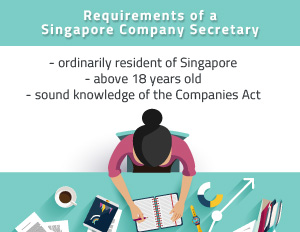As the regulatory framework for Singapore company registration under the Singapore Companies Act tightens, the role of company secretaries and resident directors are becoming increasingly important.
The provisions of Singapore Companies Act mandates the key requirements for registration of a company in the city-state as:
- at least one shareholder (individual or corporate entity)
- at least one “ordinarily” resident director
- one company secretary (must be a Singapore resident)
- initial paid-up share capital of at least S$1 (or one share in any denomination in any currency)
- a physical Singapore office address
Among these, the most important ones are the requirements of a resident director and a company secretary.
The company director (whether resident or otherwise) because he or she is the person responsible for managing the affairs. Accounting & Corporate Regulatory Authority (ACRA) – the national regulator for companies in Singapore states, “A director must make decisions objectively, act in the best interest of the company, avoid conflicts of interest, and be honest and diligent in carrying out his duties.”
And the company secretary because even though the Singapore Companies Act doesn’t define the role, duties and responsibilities of a company secretary, he or she is the officer primarily responsible for administrative and reporting functions mandated by law. Thus, it is the job of the company secretary to assist the company directors in ensuring that the company meets all its regulatory obligations.
Let’s start with analysing the role and requirement of a resident director in a Singapore company first.
Qualifications of a Resident Director
 As mentioned above, the Companies Act mandates that at least one director of the company must be an “ordinarily resident” in Singapore. This means the director’s usual place of residence is in Singapore. A Singapore Citizen, Singapore Permanent Resident, an EntrePass holder or an Employment Pass holder issued with such a pass to work in the company concerned and who has a local residential address are acceptable ordinarily residents.
As mentioned above, the Companies Act mandates that at least one director of the company must be an “ordinarily resident” in Singapore. This means the director’s usual place of residence is in Singapore. A Singapore Citizen, Singapore Permanent Resident, an EntrePass holder or an Employment Pass holder issued with such a pass to work in the company concerned and who has a local residential address are acceptable ordinarily residents.
Once the residency condition is satisfied, other criterion per se are not very strict.
The minimum age to be appointed as a company director in Singapore is 18 years, with the person concerned being physically and mentally fit to carry out the director’s duties. But importantly, ACRA defines the circumstances which disqualify a person from being a company director:
- an undischarged bankrupt
- convicted for criminal offences involving fraud or dishonesty
- a disqualification order has been made against the person by a court
- convicted for three years or more for offences under the Companies Act within a period of five years
- has three or more High Court orders compelling compliance under the Companies Act within a period of five years
- the company being wound up for reasons of national security or interest
As is obvious, a lot many people would satisfy the above requirements and are normally willing to take up the resident directorship of a Singapore company. But detailed below are several common statutory requirements mandated by ACRA which needs to be adhered to, with it being the resident director’s responsibility of ensuring that.
Going for cheap but incompetent resident directors often result in companies and their directors paying expensive penalties, additional paperwork and poor compliance ratings for the company. Thus, while a inexpensive resident director may seem a good deal at first, it may end up costing the company huge losses in the long run.
Related Reading » Responsibility of Company’s Director
Duties of Company Directors in Singapore
A company director (whether resident or otherwise) in Singapore is responsible for ensuring that the company complies with two most important statutory requirements. This includes:
- convening and holding of the company’s Annual General Meeting (AGM)
- and the subsequent filing of its annual returns by the specified due dates (normally within a month of the AGM)

If the above two are not met, either a penalty is imposed on the company or legal action is taken against the director. Additionally, the director must also ensure that the company maintains the following registers at the company’s registered office:
- register of members
- register of directors, managers, secretaries and auditors
- register of directors’ shareholdings
- register of charges
Other duties of company directors in Singapore include ensuring that the Singapore company has a local office address, a mandatory requirement under the Singapore Companies Act. Other duties include obtaining approval of company for the disposal of company’s undertaking or property, securing the appointment of qualified persons as secretaries, ensuring the publication of the company name, ensuring the registration of transfers of shares and issuance of share certificates, complying with required procedures for reduction of share capital, complying with the instruction of ACRA to change the company’s name, appointing auditors, making a declaration of solvency, and ensuring that dividends are only paid out of profits.
 The directors must also ensure corporate governance in the company. They must see to it that the company practices corporate social responsibility and adopt ethical and socially responsible practices, as well as engages with society.
The directors must also ensure corporate governance in the company. They must see to it that the company practices corporate social responsibility and adopt ethical and socially responsible practices, as well as engages with society.
In addition to the above statutory duties, a company director in Singapore is required to:
- always act in good faith in the interests of the company
- act with due care and skill
- avoid conflicts of interests; and
- use his powers for proper purposes
In cases where a company director commits a breach of duty as regards to the company, the company can sue the director for damages or for the return of specific property or secret profits he or she has made. In addition, a director who acts dishonestly, is negligent or makes improper use of information, is liable to a fine not exceeding S$5,000 or to imprisonment for a term not exceeding one year.
Do note that Singapore’s law doesn’t recognise the difference between an “active”, “inactive”, “shadow”, and “sleeping” director. Hence, even though a resident director may not be involved in the day-to-day operations, he or she is obliged to ensure that the company fulfils its statutory obligations on a timely basis. With this in mind, it is important that foreign companies place greater emphasis on selecting resident directors of the highest calibre while incorporating a Singapore subsidiary or a holding company.
Appointing a Nominee Resident Director
 A nominee director is a person appointed to represent the interests of another group or person. In Singapore, a nominee director has the same obligations and responsibilities as those imposed on a regular director by the Companies Act and the common law.
A nominee director is a person appointed to represent the interests of another group or person. In Singapore, a nominee director has the same obligations and responsibilities as those imposed on a regular director by the Companies Act and the common law.
While the minimum number of directors required for Singapore company registration is one, the maximum number will usually be stated in the company’s constitution. It’s important to note that if a company has only one director, that sole director may also be the sole shareholder of the company. But the same person cannot also serve as the company secretary. Thus, even a one-director company will still have at least two company officers – a director and a company secretary.
Read More » Can an Employment Pass Holder Be a Director of a Singapore Company
Requirements from a Company Secretary in Singapore
 While the role, duties and responsibilities of a company secretary is not defined in the Singapore Companies Act, it is an important appointment in any company incorporation in Singapore as he or she is the officer primarily responsible for administrative and reporting functions that are governed by the law.
While the role, duties and responsibilities of a company secretary is not defined in the Singapore Companies Act, it is an important appointment in any company incorporation in Singapore as he or she is the officer primarily responsible for administrative and reporting functions that are governed by the law.
The corporate secretary assists the company directors in ensuring that the company meets all its regulatory obligations and it is also his duty to keep records of Directors’ Resolutions of a company. Every company in Singapore must appoint a company secretary within six months of the date of its incorporation.
Also, similar to the “resident director”, company secretaries for Singapore companies must also be “ordinarily resident” in the country. The only difference is that even S pass holders can be company secretary, which is not allowed in case of company directors.
Qualifications and Duties of a Resident Company Secretary of a Public Company in Singapore
As per the Companies Act, Section 171 (1AA), a company secretary in Singapore must satisfy at least one of below mentioned criteria:
- been a company secretary of a company for at least three of the five years immediately before his appointment as company secretary of the public company
- a qualified person under the Legal Profession Act (Cap. 161)
- a public accountant registered under the Accountants Act (Cap. 2)
- member of the Institute of Certified Public Accountants of Singapore
- member of the Singapore Association of the Institute of Chartered Secretaries and Administrators
- member of the Association of International Accountants (Singapore Branch)
- member of the Institute of Company Accountants, Singapore
If appointed, a company secretary’s main duties include:
- Maintain the company statutory registers and records
- Memorandum & Articles of Association (MAA) – ensure that the company and the board of directors comply with this at all times
- Corporate governance – assist the company directors in implementing good corporate governance practices within the company
- Acquisitions and disposals – ensure all acquisitions, restructuring, mergers and amalgamations etc. are implemented with the company’s best interests in mind
- Arrange for shareholder and director meetings
- Lodge and file in time all necessary documents required by law
- Provide comprehensive legal and administrative support to the board
- Assist in the implementation of corporate strategies by ensuring that the board’s decisions are properly carried out and communicated
- Ensure that the company meets all its legal obligations
Moreover, ACRA mandates certain fiduciary duties for a company secretary (similar to the resident director):
- always act in the best interest of the company
- always avoid conflict of interests
- always carry out duties with reasonable care and diligence
- never make illegitimate profits from personal dealings for/with the company

Notably, a company secretary in Singapore is vested with the power to authenticate documents or formal proceedings of the company. He or she may be required to execute official documents with a company director under the common seal. Sometimes auditors too will request company secretaries to certify the records of a company’s minutes book for their annual statutory audits.
Conclusion
The above clearly shows that resident director and company secretary are two of the most important appointments that a newly-incorporated company makes in Singapore. These two appointees often work hand-in-hand on various matters pertaining to the company, ensuring all statutory compliances and take the company on a solid growth path.
Hence, it is generally advisable that foreign companies opt for a professional corporate secretarial firm to perform the role of company secretary from them in Singapore. Later, you can ask for referrals from the same secretarial firm for experienced resident directors with whom they work closely with. This will ensure speedy decisions and timely execution on all company matters.
Some firms in Singapore do provide both the services (resident nominee director and company secretary) as a package. Engaging them is even a better idea.
Responsibility for Statutory Compliance in Singapore – Company Secretaries are in it too!
 ACRA states, “Although the ultimate responsibility for complying with legal obligations lies with the company directors, the company secretary may also be held liable for the company’s failure to comply with the law in certain situations.” This is so because the Singapore Companies Act clearly recognises the dependence of company directors on the company secretary for guidance on statutory compliance issues.
ACRA states, “Although the ultimate responsibility for complying with legal obligations lies with the company directors, the company secretary may also be held liable for the company’s failure to comply with the law in certain situations.” This is so because the Singapore Companies Act clearly recognises the dependence of company directors on the company secretary for guidance on statutory compliance issues.
Thus, a competent company secretary cannot ignore any instance of non-compliance and should bring it to the attention of company directors immediately. Otherwise, ACRA may held him or her responsible for the breach.
Summons/Warrants against directors
An error or default on the company secretary’s part may lead to substantial statutory fines for the company, as well as criminal liabilities for the company directors in some cases. Government authorities such as IRAS and ACRA may issue summons (or even a warrant of arrest if summons are not responded) against company directors if a company fails to comply with regulations.
Related Reading » Singapore Company Incorporation Guide
Stay in compliance with statutory regulations in Singapore
We are constantly kept abreast of Singapore’s regulatory compliance requirements. Engage our compliance specialists today to fulfil your compliance requirements.





